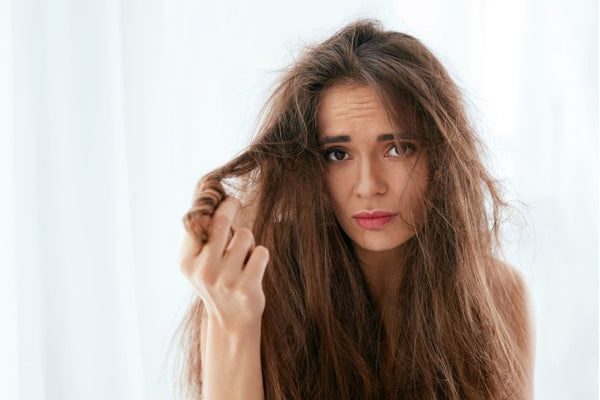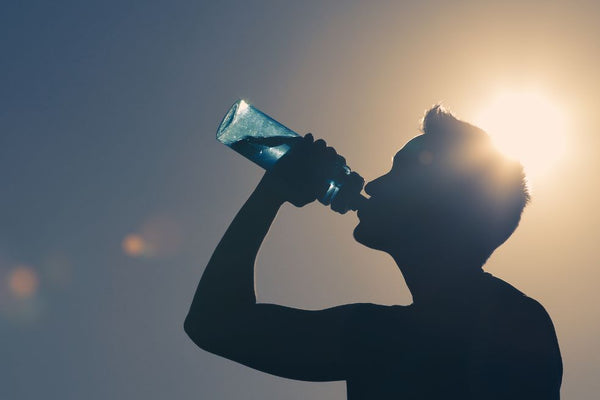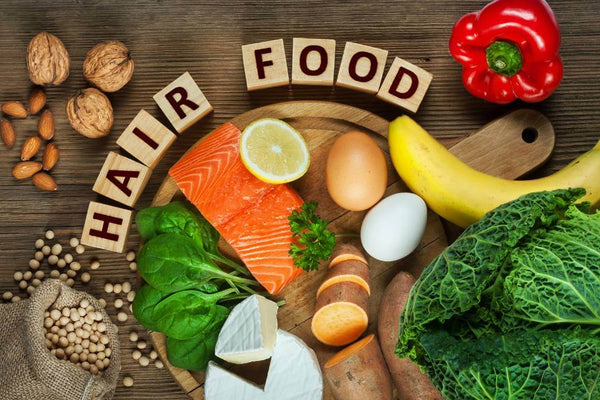Dehydration is a condition in which your body loses more fluids than it takes in. The imbalance of fluid in the body can have a detrimental effect on your overall health. Have you ever wondered if dehydration can cause hair loss?
Yes, dehydration can cause hair loss through several different mechanisms, affecting both the hair itself and the overall health of your scalp and body. One of the ways dehydration affects our hair is through an itchy or irritated scalp. In this comprehensive guide, we’ll be discussing the relationship between dehydration and hair loss. Also, we’ll explore how dehydration affects hair, the signs to watch out for, and, most importantly, how hair loss from dehydration can be reversed.
Connection Between Dehydration and Hair Loss
Hair is primarily composed of water. That’s why moisture is the fundamental aspect of its health. Dehydration can severely affect the hair’s structure and overall health. When human body is dehydrated, it redirects water to most essential organs, leaving skin, nails, and hair lacking moisture. This results in hair becoming brittle, prone to breakage, and losing its natural shine.
How Can Dehydration Cause Hair Loss?
Dehydration can affect the hair follicles, making them more prone to become brittle, dry, and fragile. Here’s how dehydration can lead to hair loss in several ways:
1. Weakened Hair Structure
Dehydration can lead to hair loss by weakening the hair structure. When your body doesn't have enough water, your hair becomes dry and brittle. Dry, brittle hair breaks and splits more easily. Dry hair is more likely to get tangled and damaged when you brush or style it. Over time, the constant breakage can make your hair look thinner and lead to noticeable hair loss.
2. Harmed Scalp Health
Dehydration can make your scalp dry and itchy, which can cause hair loss or thinning. A dry scalp doesn't produce enough natural oils, making hair weak and brittle. Moreover, the dry scalp feels itchy and uncomfortable. You might scratch your head more, which can damage hair follicles.
3. Slowed Hair Growth
Dehydration can slow down hair growth since hair follicles need water to make new hair. The cells in your hair follicles divide more slowly without enough moisture. New hair takes longer to form and grow out. Your hair might grow more slowly than usual or stop growing temporarily. You may notice fewer new hairs replacing the ones that naturally fall out.
4. Nutrient Deficiency
Dehydration can cause a nutrient deficiency in your hair follicles. When you don't drink enough water, your body can't properly transport essential nutrients to your hair roots. Hair is often one of the first areas to be sacrificed when the body is nutrient deficient. In such cases, the body shifts nutrients to more critical organs and systems. Without these nutrients, your hair can become weak, thin, and more likely to fall out.
5. Hormonal Imbalance
Dehydration can cause a hormonal imbalance in your body, which can make your hair fall out more. When your body is not properly hydrated, your body's stress levels can increase, leading to changes in hormone levels. These hormonal changes can affect hair growth and contribute to hair loss.
Find out if hair loss can be reversed.
Signs of Dehydrated Hair
Recognizing the signs of dehydrated hair is crucial to prevent further damage. The symptoms of dehydrated hair can vary in intensity depending on the extent of dehydration. Here are some common signs of dehydrated hair that can lead to hair loss:

Dryness: Dryness is the first sign of dehydrated hair that you should be aware of. Dehydrated hair is often dry and lacks the natural shine and smoothness associated with well-moisturized hair.th well-moisturized hair.
Brittleness: Dehydrated hair becomes brittle and prone to breakage. It might snap or split easily when handled or brushed.
Rough Texture: Dehydrated hair can feel rough. Also, cuticles may be lifted, making the hair strands feel uneven and coarse.
Tangled and Frizzy Hair: Dehydrated hair tends to tangle easily and becomes frizzy, making it difficult to manage and style.
Lack of Elasticity: Healthy hair is elastic and can be stretched without breaking. However, dehydrated hair lacks elasticity and may break when stretched.
Split Ends: Dehydrated hair often develops split ends, where the hair shaft splits into two or more separate strands at the tips.
Dull Appearance: Dehydrated hair appears dull and lifeless due to the lack of moisture and natural oils that give hair its shine and vibrancy.
Itchy or Irritated Scalp: An itchy or irritated scalp can be a sign of dehydrated hair. When your hair lacks the necessary moisture, it can lead to a dry scalp, causing discomfort and irritation.
Increased Hair Loss: Increased hair loss can be another symptom of dehydrated hair. When our hair lacks proper hydration, it becomes weaker and more prone to breakage, leading to increased shedding. Inadequate moisture can strip the hair of its natural oils, making it dry and brittle, causing the hair to fall out more quickly.
Difficulty Retaining Moisture: Dehydrated hair struggles to retain moisture even after conditioning, making it more difficult to achieve proper hydration.
Proper Hydration Techniques For Your Hair
Properly hydrating your hair involves nourishing your hair from within and externally. Here are some proper hydration techniques:

Drink Sufficient Water: Maintaining good hydration levels throughout your body is the simplest and most effective way to keep your hair hydrated. Aim for at least 8 glasses of water a day. Drinking enough water is incredibly good for your hair health. When we stay properly hydrated, it nourishes our hair from the inside, encouraging healthy growth.
Include Hydrating Foods: Consume foods that have higher water content like fruits and vegetables, which contribute to overall hydration. Also, include cucumbers, watermelon, oranges, and other hydrating foods into your meals.
Balanced Diet: Ensure your diet includes vitamins and minerals that promote hair health. B vitamins, iron, zinc, and protein are particularly essential for maintaining your hair hydrated and strong.
Use Hydrating Shampoos and Conditioners: Use shampoos and conditioners which are specifically designed to add moisture to your hair. Avoid harmful ingredients in shampoo; instead, look out for products like aloe vera, coconut oil, and hyaluronic acid.
Read More: Why Chemicals Like Parabens are Bad for Hair?
Deep Conditioning Treatments: Treat your hair to deep conditioning treatments regularly. These treatments can penetrate the hair shaft and provide much-needed moisture and nourishment.
Natural Oils: Include natural oils like argan oil, coconut oil, or jojoba oil into your hair care routine which can help lock in moisture and add a protective layer to your hair.
Can Hair Loss from Dehydration Be Reversed?
If you're experiencing dehydration related hair loss, you might wonder if it can be reversed. In many cases, hair loss from dehydration can be reversed. By addressing the root cause of the problem, which is inadequate hydration, you can help your hair regain its health. Start by increasing your water intake and drinking enough throughout the day. Drinking sufficient water will help hydrate your body, including your hair follicles, and promote healthier hair growth.
How to Treat Dehydration Hair Loss
If you are suffering from dehydration related hair loss, then you should start addressing the root cause. Make sure that you're drinking an adequate amount of water daily. It is typically recommended to drink around 8-10 glasses of water per day. However, the specific needs may vary based on factors such as age, activity level, and climate.

Also, reduce or stop consumption of dehydrating substances like alcohol and caffeine, which can lead to increased fluid loss in the body. Increase the consumption of fruits, vegetables, lean proteins, and healthy fats. These are the foods that will provide vitamins and minerals, like biotin, vitamins A, C, D, and E, iron, and zinc, which are important for hair growth.
Dehydration can affect your scalp, which leads to dryness and dandruff. That's why you should a moisturizing shampoo and conditioner to hydrate your scalp and hair. Avoid excessive styling with heat, which can further contribute to hair damage. Also, avoid overwashing your hair, which can strip it of natural oils, leading to dry scalp and hair loss.
Healthy Diet for Hydrated Hair
Here are some healthy diets for maintaining healthy hair:
Proteins-Rich Foods: Incorporate protein sources in your diet, like lean meats, eggs, and legumes. Protein is a building block for healthy hair that can help maintain strength and hydration.
Omega-3 Fatty Acids: Consume foods that are rich in omega-3 fatty acids, like salmon, flaxseeds, and walnuts. Omega-3s contribute to a healthy scalp and hydrated hair.
Vitamins and Minerals: Ensure your diet includes a variety of fruits, vegetables, and whole grains. These foods contain essential vitamins and minerals that promote overall hair health and hydration.
Conclusion
Dehydration can have a significant affect on hair health. When your body lacks proper hydration, your hair can become dry, brittle, and prone to breakage, leading to hair loss. However, the good news is that dehydration-induced hair loss can often be reversed by addressing the root cause and implementing proper hydration techniques. By drinking sufficient water, consuming hydrating foods, and following a balanced diet rich in essential vitamins and minerals, you can nourish your hair from within.
Laser Helmet for Hair Growth
Dehydration alone might not be the reason for the hair loss. There are many other reasons responsible for hair loss, including stress, underlying medical conditions, genetics, nutritional deficiencies, etc. LLLT treatment can help you prevent hair loss and protect your luscious locks. So, opting for laser hair growth devices is a good idea.
Theradome is clinically proven to promote hair growth by stimulating hair follicles. It might not directly address dehydration, but it can be used with other hair loss treatments. The use of Theradome laser hair helmet with other treatments helps increase the treatment's effectiveness.


































